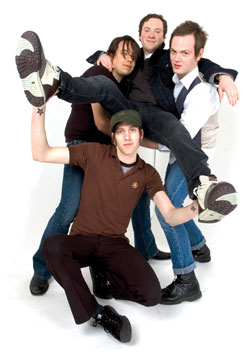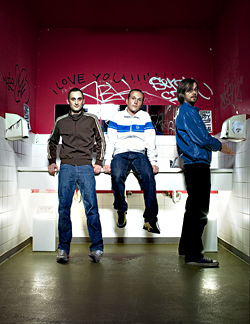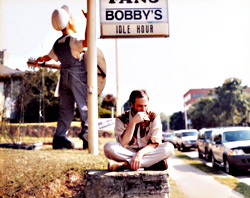Yes! Call it the power pop manifesto, unshakably affirmative; three chords for the new optimism! In 1978, Greg Shaw, eternal teenager and founder of the Bomp! fanzine and record label, hinted at the emergence of new wave—starring softies like Squeeze and the Knack—from the dingy shadows of punk and prog rock. “It’s dangerous to give out these tricks of the trade to the uninitiated, but I’ll tell you this one,” he wrote in an issue devoted to power pop, “the easiest way to spot a new trend a year or two before it breaks is to look at the most interesting new groups making the rounds of the street scene, and see what they have in common. While the record industry is asking itself whether new wave will be a passing fad, we laugh because we know that every young musician starting up a band in 1977 dreams of joining the new wave, and we also know that with each succeeding wave, new ideas, new trends come in.”
Even Shaw couldn’t have predicted that, 30 years on, new wave would be a guiding force in pop music. Or that you’d find your new favorite band simply by Googling your old favorite band. So when second waver Shane Berry shouts, “The answer is yes,” opening the Divorce’s The Gifted Program, it’s equal parts mission statement and middle finger, every bit as affecting as the Jam’s “Start!” What’s he pointing at? “We don’t know the question yet,” he adds.
Who knows? Who cares! New wave hasn’t mellowed one bit in middle age.
y today’s standards, the Divorce have built a following the old-fashioned way: with gigs and radio play. When their debut, There Will Be Blood Tonight, was released in 2003, Web 2.0 was still in beta testing. The fact that both commercial radio and KEXP-FM (90.3) supported the record was a windfall for the band. A successful single on 107.7 the End saw their audience grow almost overnight. While their fan base expanded, support from their label, Fugitive, receded. “I don’t think we knew what we wanted at that time,” Berry says of the Divorce’s sound and direction when signing to the offshoot of Tooth & Nail, which folded shortly after Blood‘s release. In the interim between records, they booked their own tours and added Garrett Lunceford on guitar. Asked if they’ve sought advice on the precarious business, Berry says, “A lot of our friends in bands are at about the same level, a few have gone on to major labels, and others have been completely independent. You see the repercussions [of both], and it keeps you on your toes.”
“MySpace kinda creeps me out,” Berry admits, discussing the new wave of marketing tools by phone from his Seattle home. Like many who grew up just outside the Internet boom, he has a healthy distrust of ready-made RIYL culture. “On our last tour, some people in L.A. [came to see us], and one of them had a friend working in music at MySpace. The next week we got home, and they had us on the front page. We gained, like, a thousand fans.” While that many pairs of ears would appeal to any band, it’s difficult these days to separate the fan from the fickle.
“I guess it’s good to get your name out there, but it is moving toward the weird Warholian 15 minutes of fame,” he says. “While I love the Fugazian idea of an artist being just like the people they’re playing for, I appreciate the space between the artist and audience. Maybe that’s old-fashioned and ridiculous, and I don’t think we’re better or doing something they can’t do.”
In short, he’d just prefer a little breathing room.
The Gifted Program is instantly recognizable to fans of pop’s last great heyday—Kyle Risan double-beats with Jimmy Curran’s itchy bass lines, and Lunceford’s guitar seems raised on college radio and AM pop. Berry’s songwriting also enjoys some distance. Far from the postadolescent cars- and-girls tropes of the Bomp! brigade, his non sequiturs sound like the good lines of bar conversation you want to write down before you forget. So it’s surprising to hear he doesn’t. “I just hum lines to myself constantly,” he says. “Cash Machine” segues seamlessly between consumerism and the postmortem: “Just name your price/Something nice/Let the bidding start at/Maybe your first breath/Maybe yourlast gasp.” “Birds = Magic” and “Doctors and Friends” borrow arena-size melodies for barroom balladry, while “Deny! Deny! Deny!” sullies the backing harmonies with a little post-hardcore squelch. And among “Air Traffic Control” and “Be Quiet,” Berry slips between a TRL-ready croon and post-punk scat. Couple that with unhinged energy onstage, and you’ve got a veritable cross section that leaves a little something for everybody.
Which begs the question: Who does the artist make music for, oneself or one’s audience? For this group of friends who met in the local scene, the MO is direct, and Berry is shamelessly genuine when discussing it: “All we aim for is the ability to put out records we’re proud of. However we can do that.” Some degree of commercial success is important, he adds, “Because you can’t afford to make a record you love in the studio, with an engineer that you want to work with, unless you have some monetary backup.”
The Divorce succeed where so many new and nü-new) wavers falter. You can’t stay 17 forever, so to speak, even at 27. “It’s never been a goal of ours to get a formula and then drive it into the ground,” Berry says. “Our first records hopefully do sound youthful, and I hope we do keep that energy around, but stagnation is just not an option.” And with a record’s worth of songs ready for the studio, Berry is anxious to explore the robust vocal styling of Scott Walker and Thom Yorke for the next go-round. “I’m pushing for a more elegant, mature sound,” he adds. Who could say no to that?








